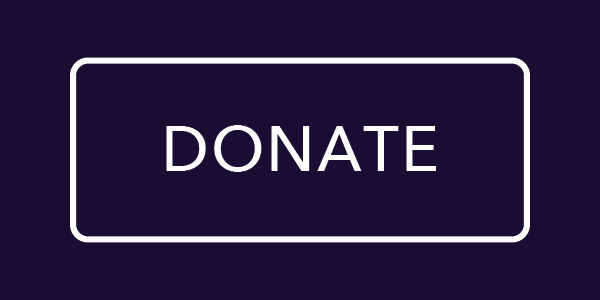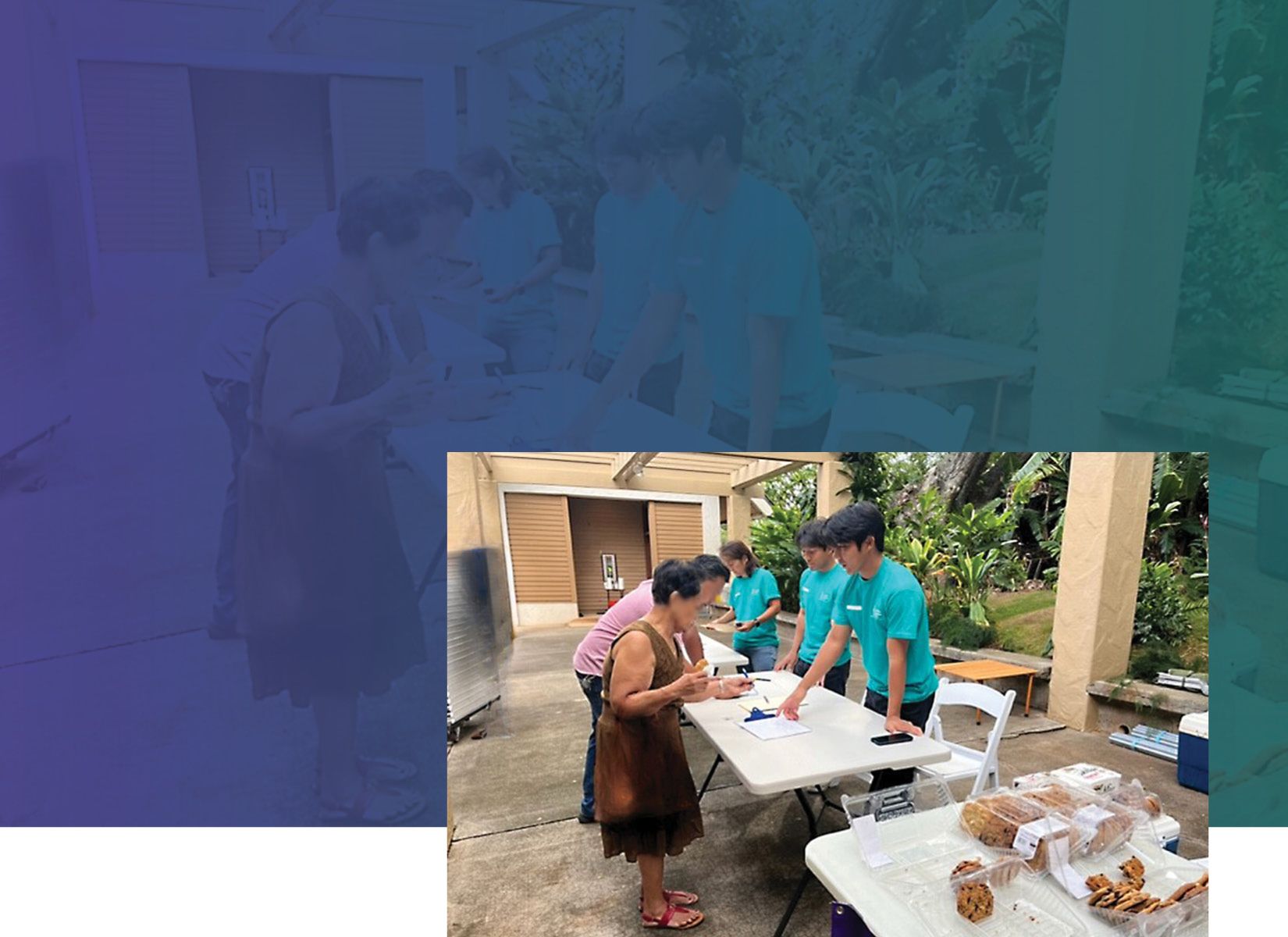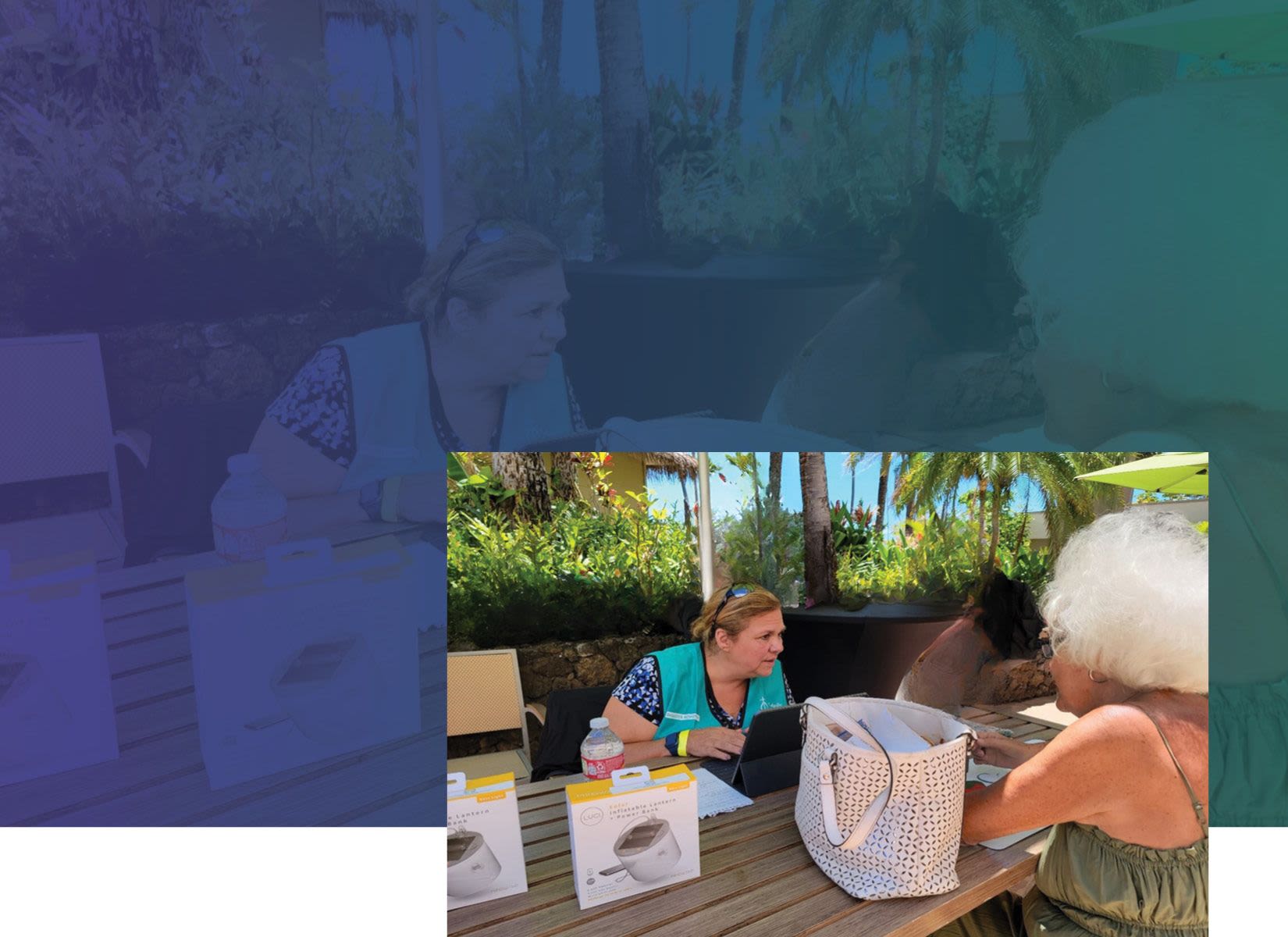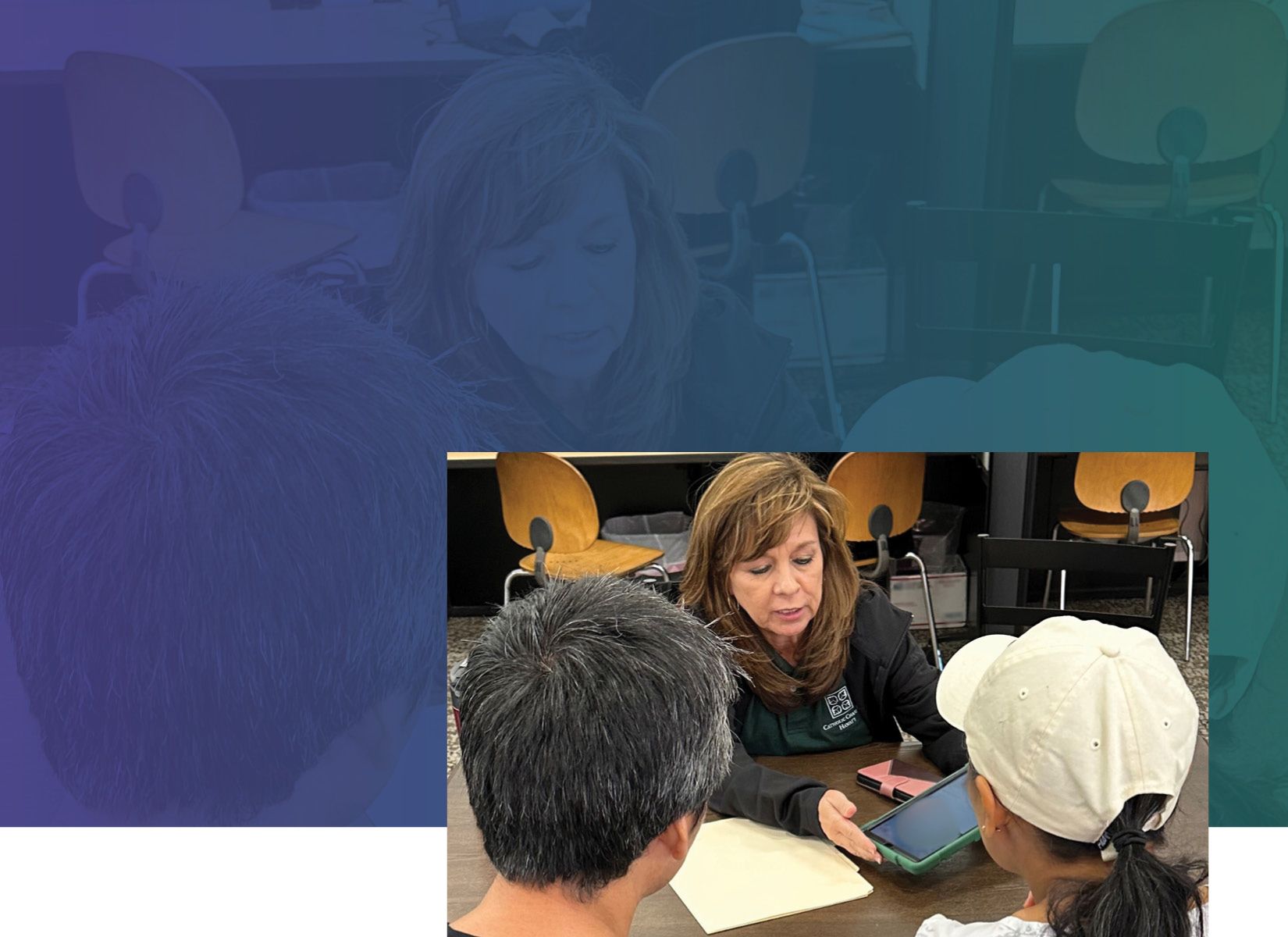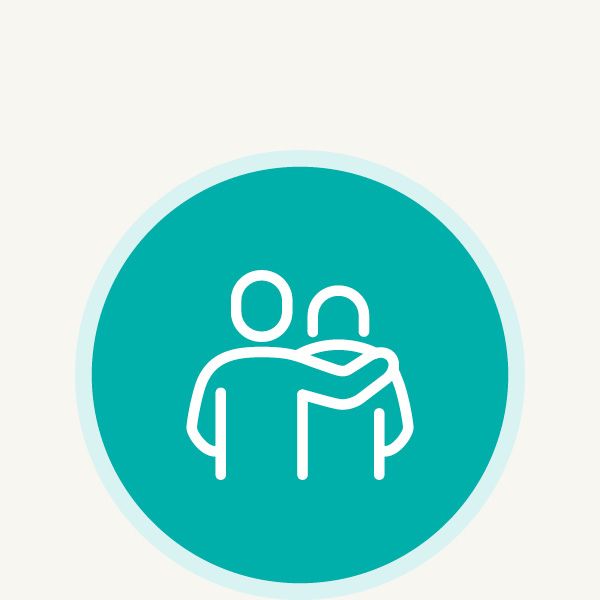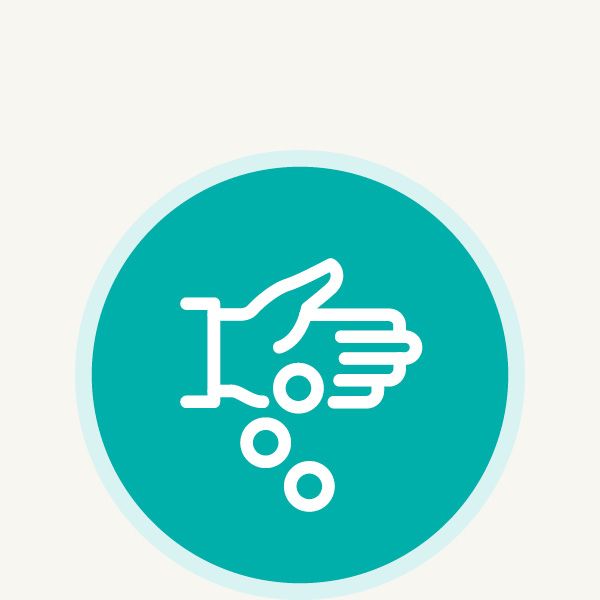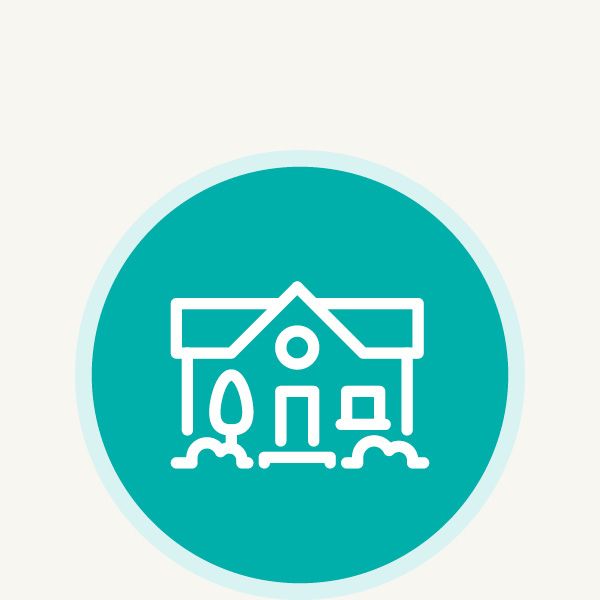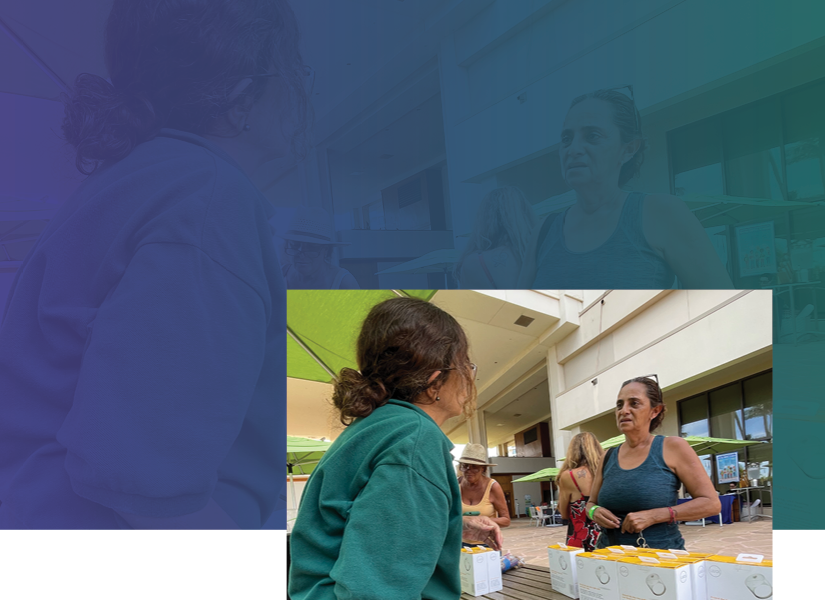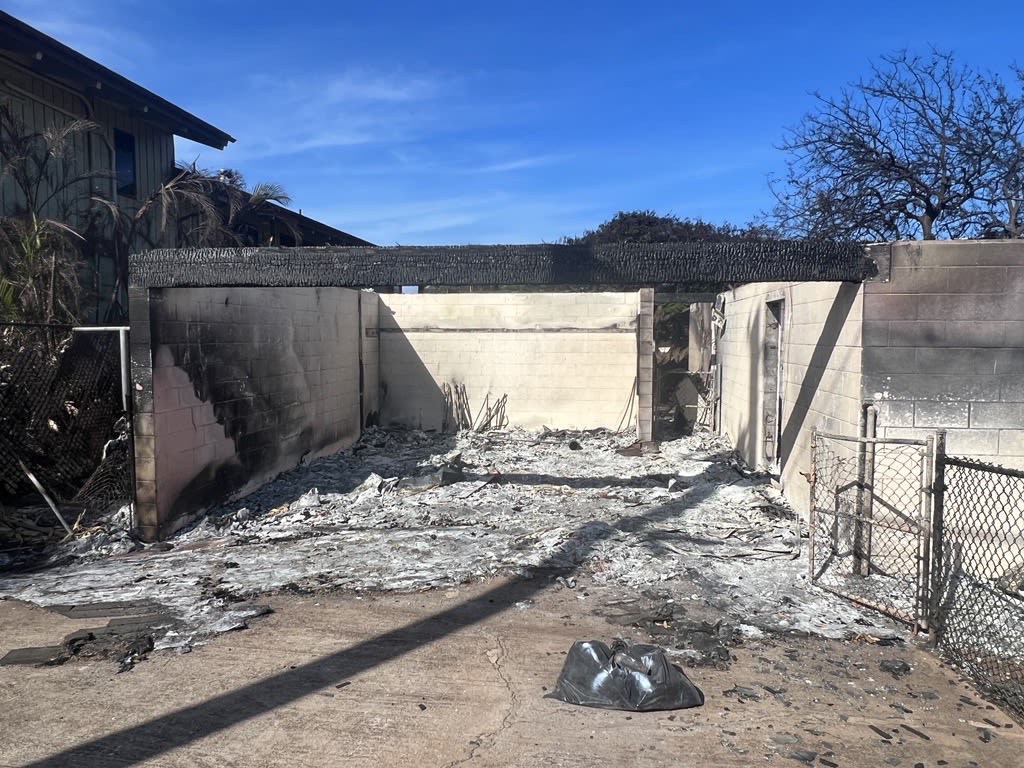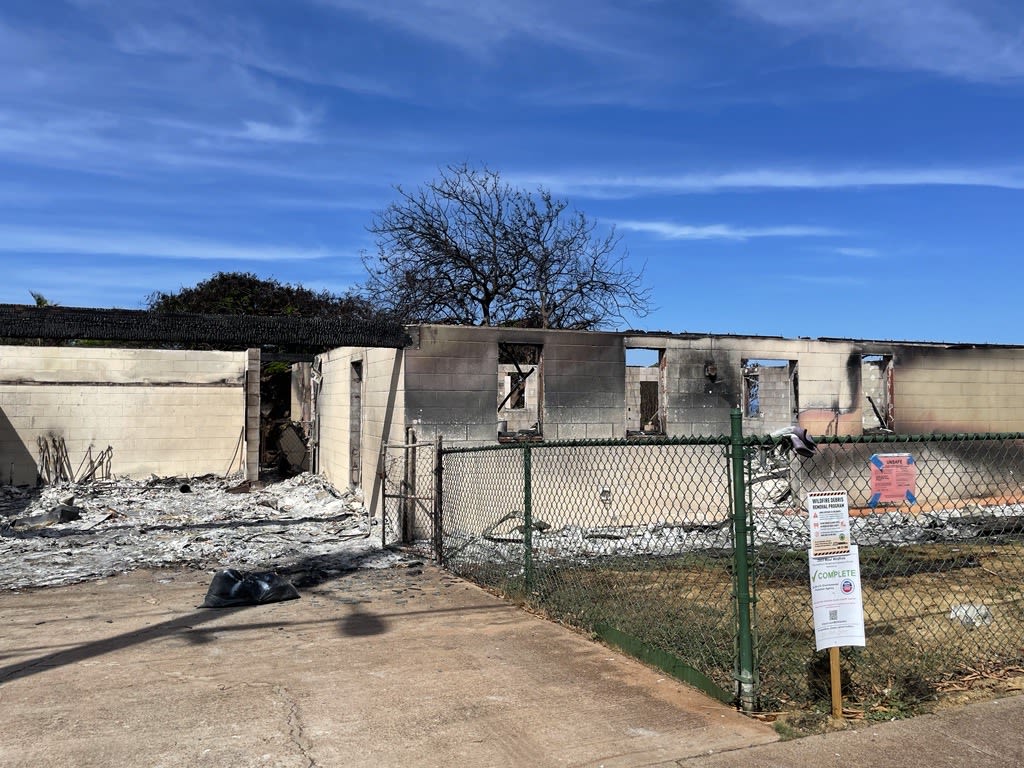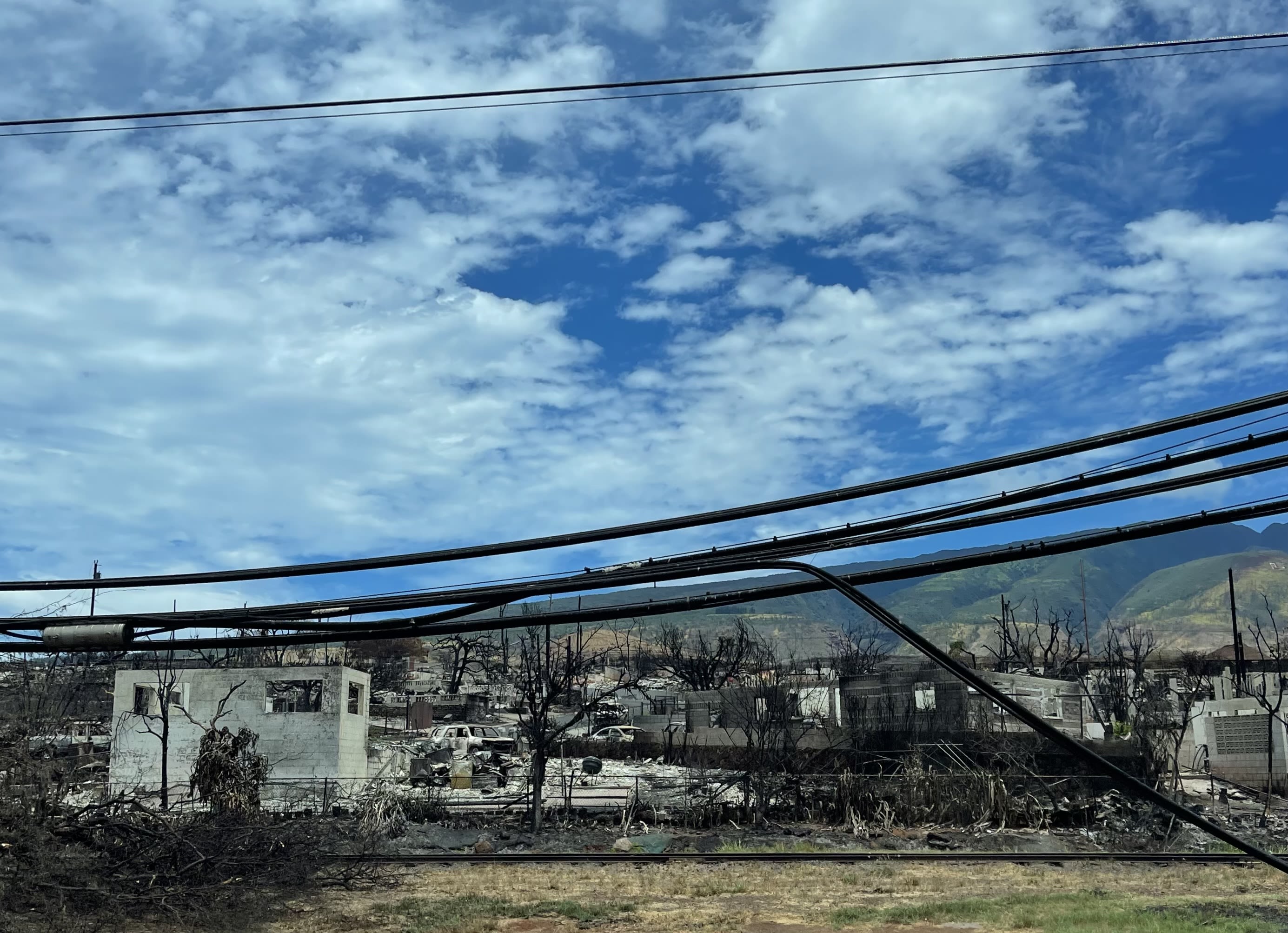Aloha and Blessings
amid the Ashes
After devastating wildfires, Catholic Charities Hawaii helps a community heal
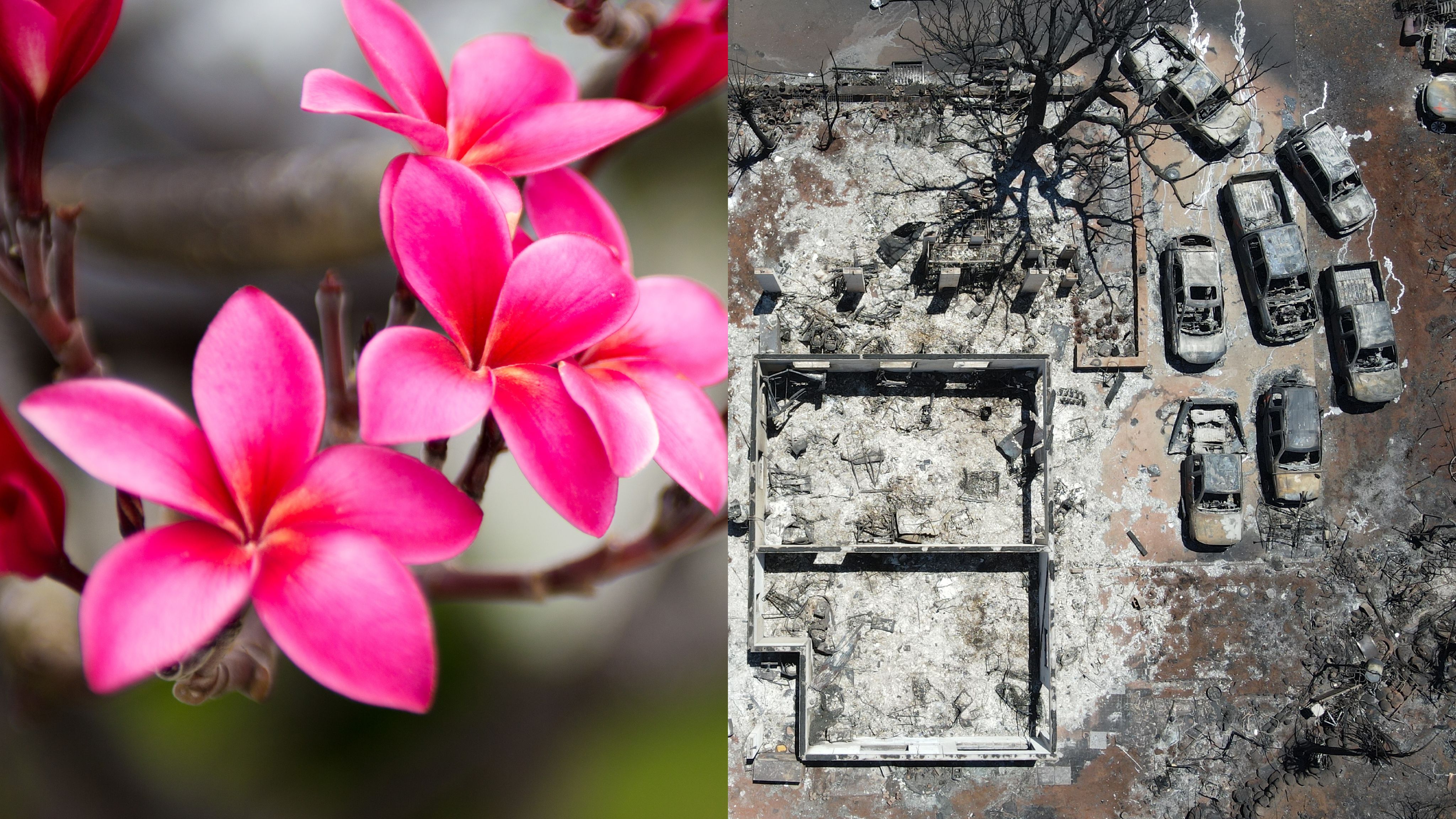
One jar of peanut butter and two cans of cream of mushroom soup.
When they fled their house from the fast-moving Maui wildfires last August, Kat and Barrett Procell hardly had time to think, much less to grab essentials — just those random few jars of food. For a few hours earlier that day, they were confident their house in Lahaina would be protected by a deep, water-filled ravine nearby, wide enough that the fire couldn’t possibly jump it. Until it did.
When they felt the heat on their faces, they knew it was time to go.
“It was the type of fire where people, if they ran back inside to grab their wallet, they didn’t make it,” says Barrett, who until that day was a spearfishing guide on tourist boats.
The two jumped into their Jeep with their meager provisions, a spoon and a fork. They took a back route over the mountain, away from the fire, grateful that the two youngest children in their blended family were at their mother’s house that day, outside of the burn zone.
That ride propelled them from the hellscape they had just
left behind into something just as surreal.
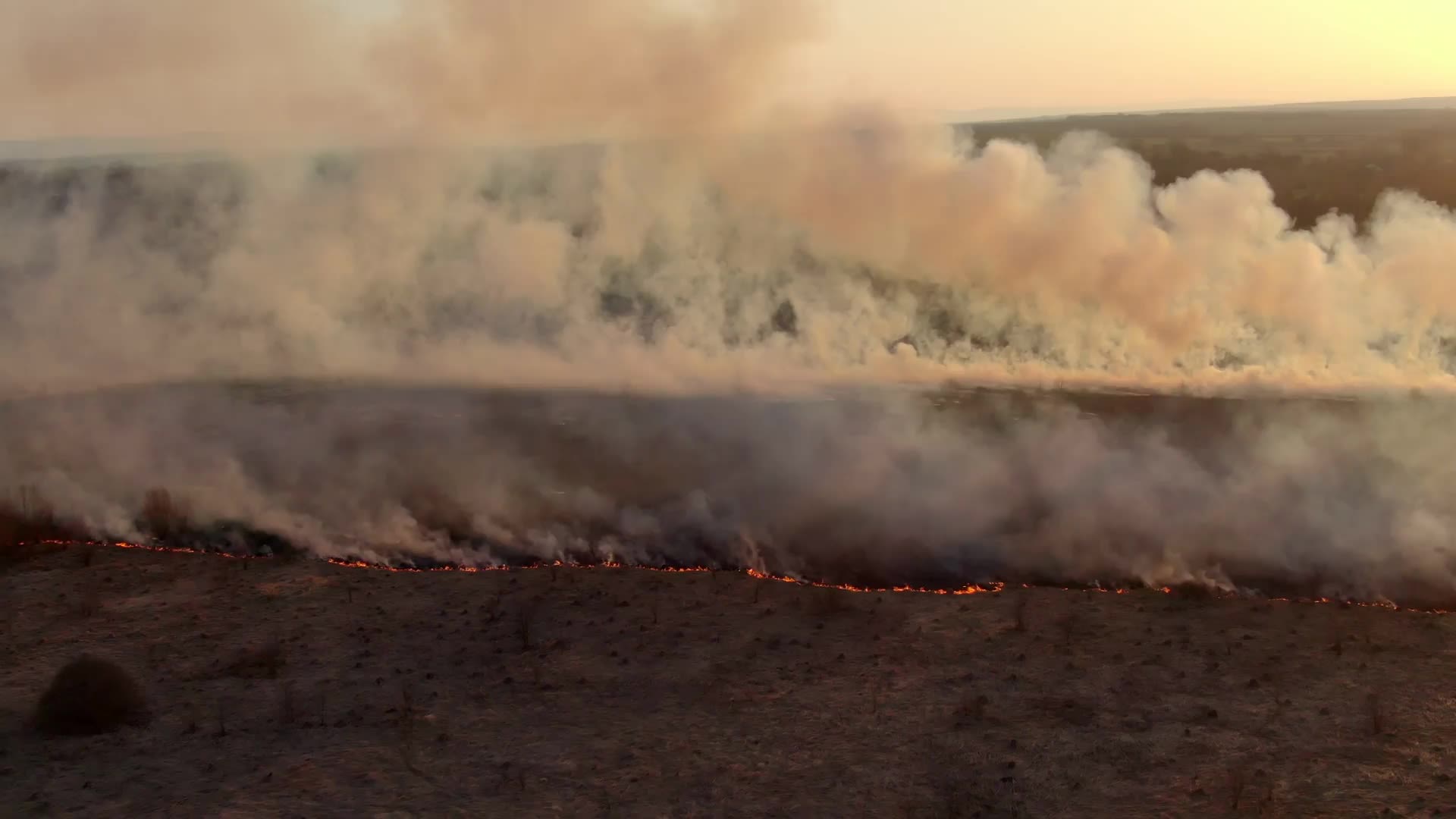
That ride propelled them from the hellscape they had just left behind into something just as surreal.

“It was apocalyptic what we were leaving,” says Kat. “When we finally shot out on the other side of the mountain, it was like the scene from the Wizard of Oz when it’s black and white and then it goes to color.” The couple passed into a retail corridor of superstores and chain restaurants untouched by the fires ravaging lives and neighborhoods just a few miles away.
They stopped at a Chick-fil-A, where a woman gave them a $100 bill, tears in her eyes. In retrospect, says Barrett, it’s no wonder she took pity on them. “We’re scarfing down our food. We’re dirty, and we probably stink.”
It was the first act of kindness from a stranger on their post-fire odyssey into their new lives, but it would not be the last. If the Maui wildfires of August 8, 2023, made one thing clear, it was that as quickly as fire can tear down a community, the generosity, selflessness and resourcefulness of neighbors and strangers alike can help it begin to rebuild.
“We got donations from practically every state. In fact, we probably did get donations from every state,” says Celeste Imamura, development and communications manager at Catholic Charities Hawaii, which has taken a lead role in the local disaster response. “We even got donations from other parts of the world. … Hawaii is just a special place, and people really rallied around us.”
| Finding their Niche
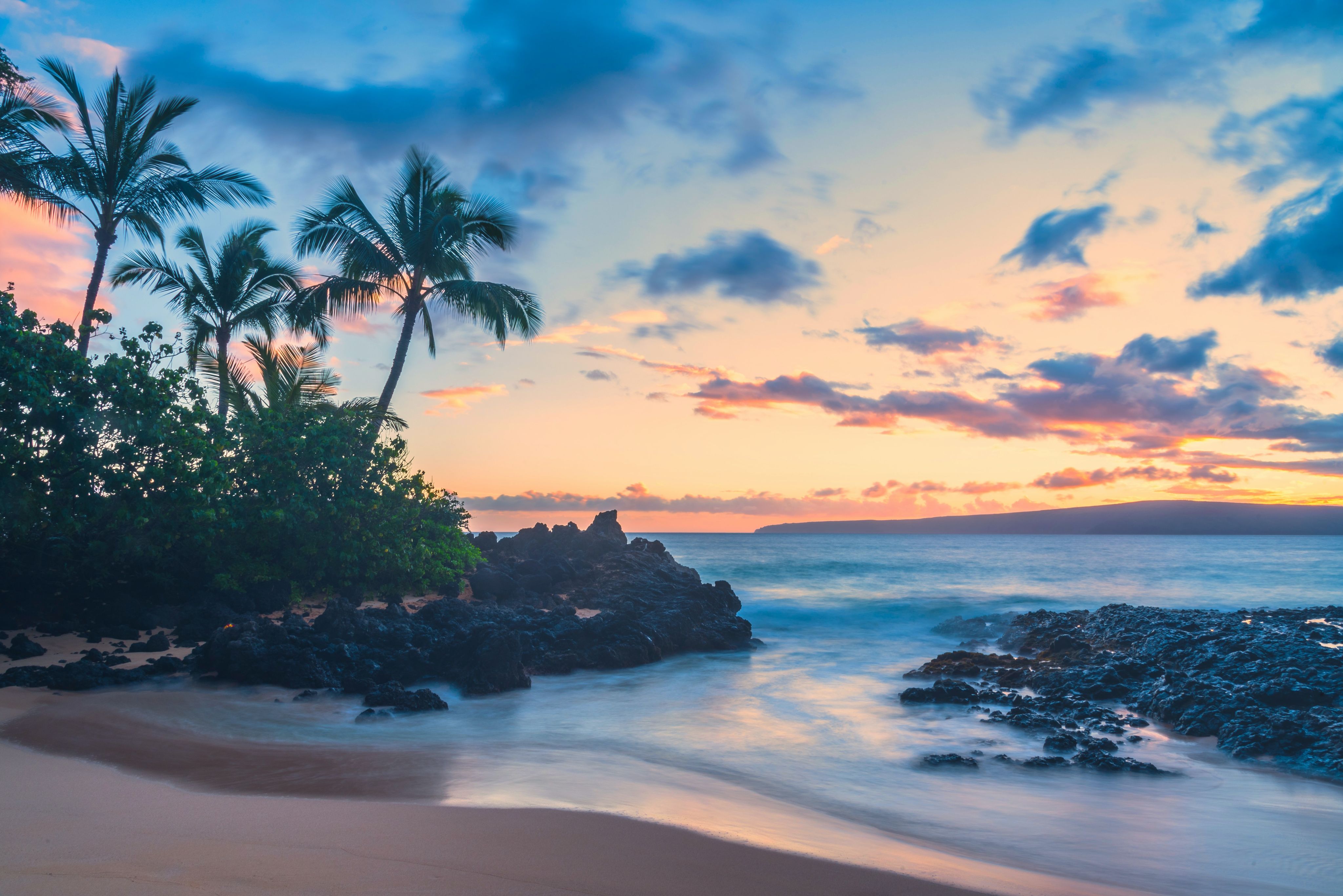
Catholic Charities Hawaii staff members meet with wildfire survivors. Staff set up in hotel lobbies, where survivors could sign up for services and learn about resources available to them.
Catholic Charities Hawaii staff members meet with wildfire survivors. Staff set up in hotel lobbies, where survivors could sign up for services and learn about resources available to them.
At the main Catholic Charities office on Oahu, disaster staff had their eyes on a hurricane off the coast last August, knowing that Maui wasn’t its target. Maui, says Shellie Niles, director of advocacy and community relations, “tends to be the island that gets spared because it’s in the middle.” Wildfires were not top-of-mind that day. Until they were.
The near-complete destruction of the historic town of Lahaina, in West Maui, is the worst disaster ever to hit Hawaii, one for which no agency could truly have been prepared. But the Catholic Charities (CC) Hawaii disaster team — which has since grown to at least 23 people — sprang into action right away. Local staff and the Catholic Charities USA (CCUSA) Disaster Response Team, along with other National VOAD (Voluntary Organizations Active in Disaster) members and partners, including the Red Cross, FEMA and others, began participating in planning and response meetings the next day.
“The Catholic Charities USA Disaster Response Team undertook immediate action from the onset and worked with us by sending financial resources, equipment and supplies,” says Rob Van Tassell, CC Hawaii president and CEO, noting that CCUSA gave his agency more than $2 million in disaster aid. “They also assisted with key connections with FEMA, Home Depot, Walmart, Airbnb and other critical national partners in both short-term and long-term relief efforts.”
$2+ million
in disaster aid was given to Catholic Charities Hawaii by Catholic Charities USA.
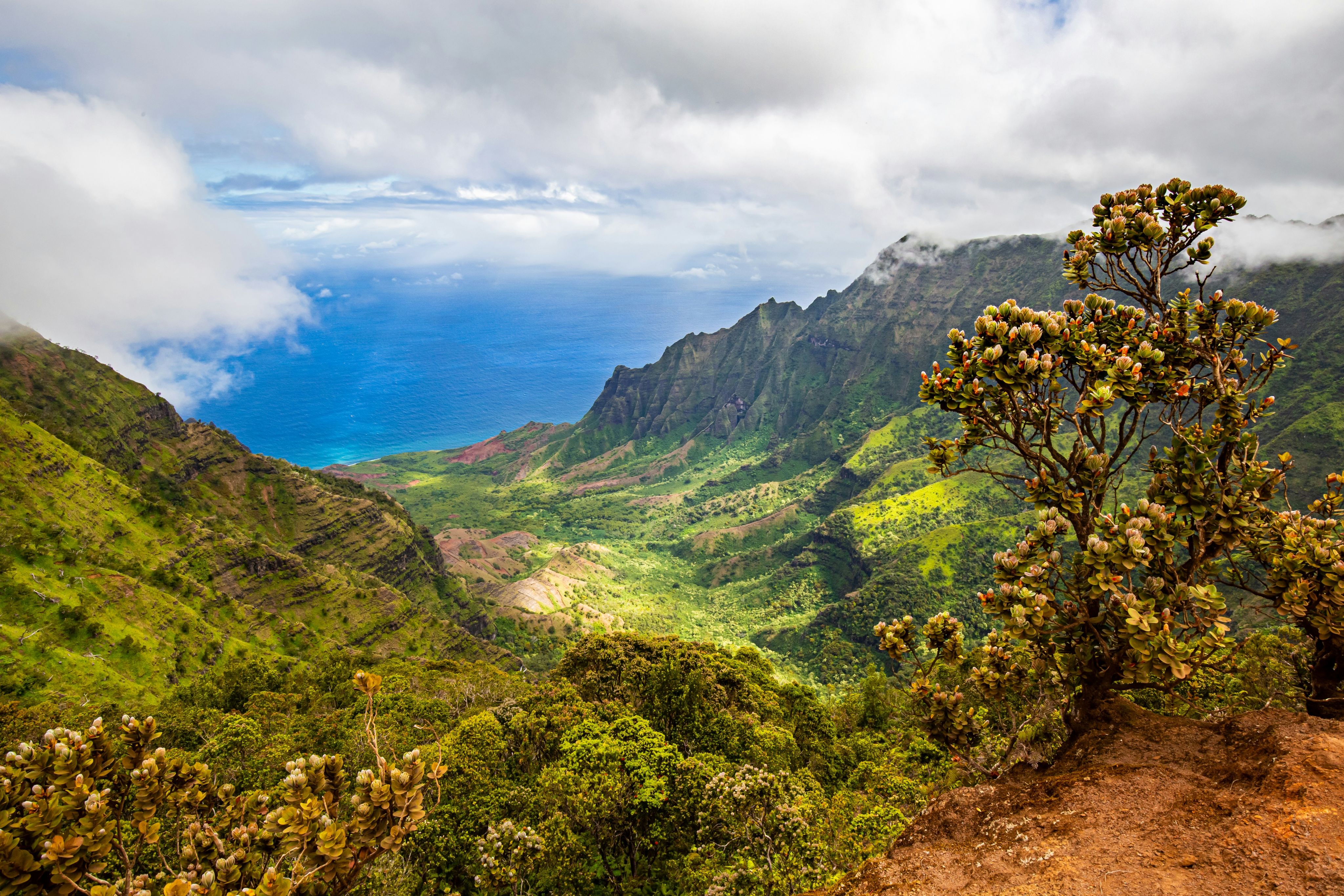
$2+ million
in disaster aid was given to Catholic Charities Hawaii by Catholic Charities USA.

The most pressing need was housing — about 4,000 units were lost in the fires. After the first few days of putting people in mass shelter facilities, survivors began sheltering in hotels — as many as 6,000 individuals at the start of the crisis, with about 4,000 still living in 16 hotels six months later. From the start, Catholic Charities was among the agencies staffing hotel lobbies to meet with prospective clients, whose needs ranged from searching for missing relatives to registering for FEMA benefits. One CC Hawaii disaster staff member devoted several weeks just to coordinating lists of missing friends and relatives.
“We were really trying to find our niche and what made the most sense given our experience,” says Shellie. “We didn’t want to duplicate services, and we wanted people to optimize the resources they had.”
Rental assistance seemed to be the answer. Catholic Charities Hawaii, through a grant from Airbnb, was able to house more than 20 families for a maximum 30-day stay while they navigated their next steps. But longer-term solutions remained a challenge.
Kim Burgo, CCUSA's vice president of disaster operations, meets with clients in a Maui hotel lobby and distributes solar-powered phone chargers, which were donated through CCUSA.
Kim Burgo, CCUSA's vice president of disaster operations, meets with clients in a Maui hotel lobby and distributes solar-powered phone chargers, which were donated through CCUSA.
| Priced Out of Paradise
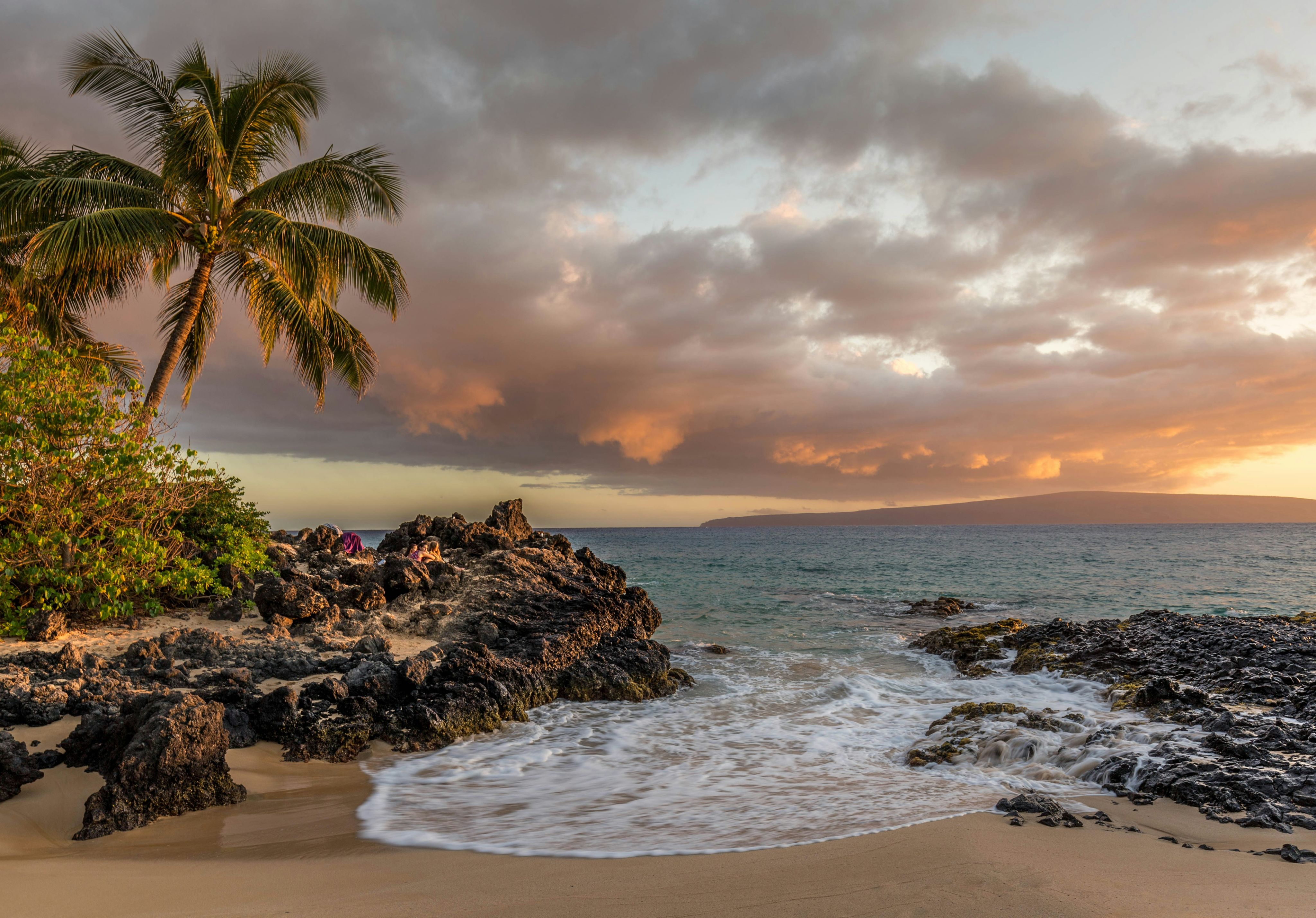
Be-Jay Kodama, vice president of philanthropy at Catholic Charities Hawaii, aids clients in registering for services after the Maui wildfires.
Be-Jay Kodama, vice president of philanthropy at Catholic Charities Hawaii, aids clients in registering for services after the Maui wildfires.
Like much of the country, Hawaii has a serious lack of affordable housing. West Maui is home to major resorts and short-term rentals, so such housing was already scarce. In the wake of the fires, with FEMA covering up to 175% of the market value of rental costs, landlords raised rents, exacerbating an existing problem.
Compounding the housing issue was the fact that many people lost not only their homes but their jobs. And those whose homes didn’t burn but whose places of work did were in danger of losing their homes for failure to make rent or mortgage payments.
Given this dearth of affordable rentals and the number of people staying long-term in hotels, disbursing financial assistance ended up making more sense. The agency began distributing Divvy cards, essentially smart debit cards that clients could use to pay necessary expenses with money loaded by Catholic Charities based on assessed need and family size.
“Toothpaste, toiletries, hygiene products — those basic needs that were so important, that’s where we were supporting those impacted by the wildfires and giving them that sense of dignity that they still had choices they could make,” says Be-Jay Kodama, vice president of philanthropy. “They had hardly anything. It goes back to what we do best here at Catholic Charities, which is meeting people where they’re at. It’s been so helpful for families to be able to do what they need — pay a cell phone bill, make a car payment, use it for gas. They have the freedom to do that.”
The Catholic Charities Impact
Catholic Charities Hawaii staff meet with clients daily to gauge their evolving
needs and determine how much more cash assistance to provide. As of six months after the fires, and with the help of generous donors and CCUSA:
2,300+
wildfire survivors served through Catholic Charities Hawaii
$1.8M
in assistance distributed via 845 debit cards
$2.9M
in housing-related
payments (utilities, past-due rent, mortgage payments, etc.)
$39,000
worth of gift cards to provide support for basic needs
According to local reporting, another problem is emerging, as the hotel assistance program expiration date of April 10 nears. FEMA has leased nearly 1,500 fully stocked and furnished units for survivors, but many remain empty because they aren’t in or aren’t close enough to West Maui, and residents of Lahaina are reluctant to leave their close-knit community and uproot their families after the trauma of the fires.
| The Struggle to Heal
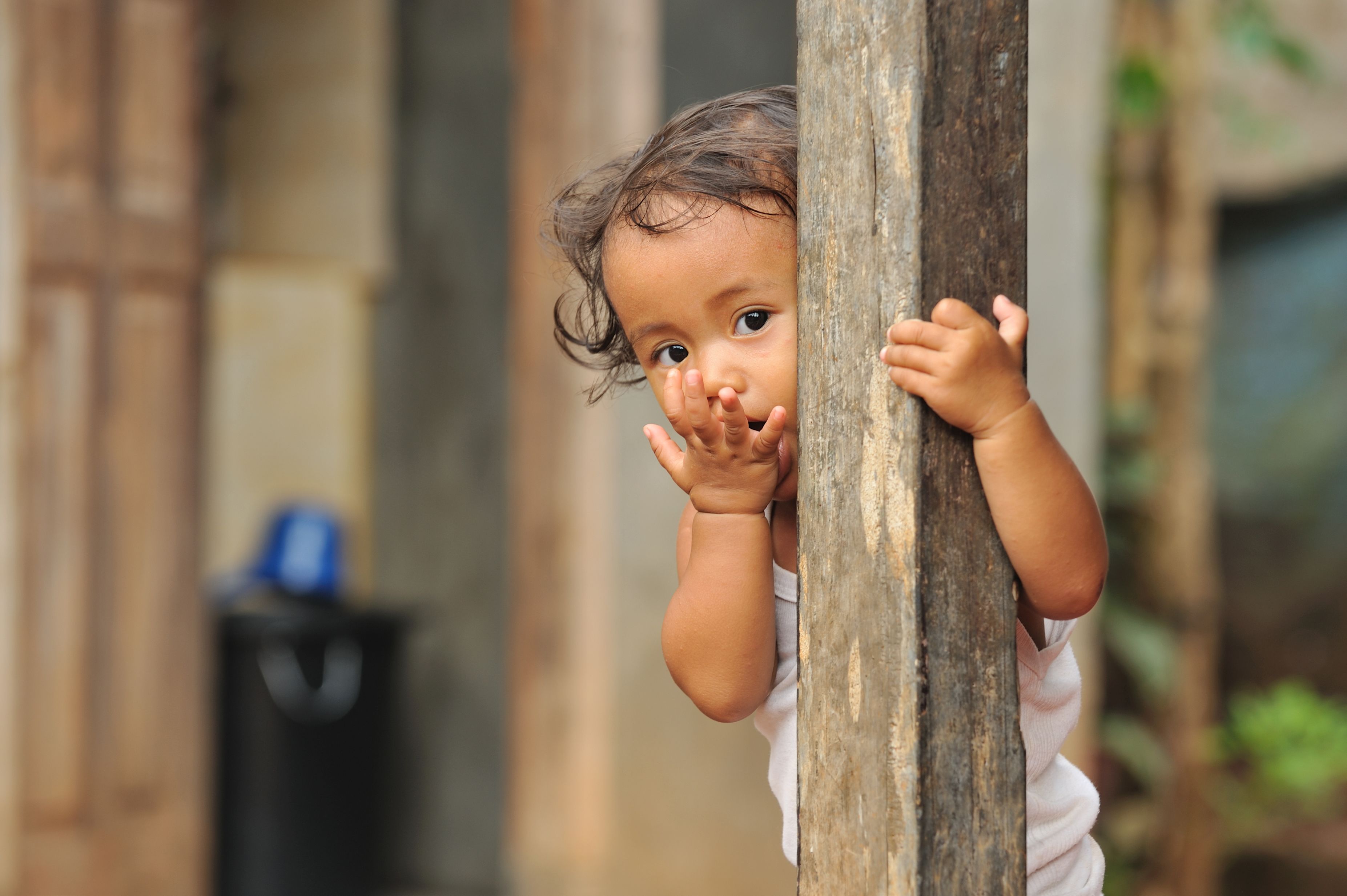
Michele Leon was living in Lahaina in a rented home with her partner, two children and 13 grandchildren. When the lease expired in August, just before the wildfires, and they couldn’t find a large enough house, the family split up. Then the house Michele was moving into burned, as did the houses and apartments her family moved to, as well as Michele’s elderly parents’ house, displacing 17 family members in all.
What followed was a succession of hotels, where they were put up by the Red Cross, and apartments, with rental assistance from CC Hawaii. Michele was out of work for a few months, not because the auto mechanic shop where she was employed was destroyed but because residents weren’t allowed back into the burn zone until October.
She is frustrated by the housing situation on Maui and is disheartened by the number of people who’ve left Hawaii, although she understands why they’ve done it.
“Priced out of paradise, again,” she says, noting that she and her family have no intention of leaving. “My parents are 90 and 91, they’re in no condition to move. Our whole life is here, for over 50 years. I will not move away from my parents, ever.”
The fire didn’t just take away their homes and belongings, it also impacted Michele’s sense of self. She volunteers as the outreach coordinator for Sacred Hearts Mission Church in Kapalua, a missionary church of Maria Lanakila Catholic Church in Lahaina — both structures survived the fire, although the parish school did not — directing people in need of services to agencies that can assist them. She also organizes monthly community projects, such as packing bags for the elderly and those in need.
The burned-out ruins of Michele Leon's parents' home. The couple are in their 90s.
The burned-out ruins of Michele Leon's parents' home. The couple are in their 90s.
Because of their age, Michele Leon's parents will never leave Hawaii, and she won't leave them, despite losing her home and theirs.
Because of their age, Michele Leon's parents will never leave Hawaii, and she won't leave them, despite losing her home and theirs.
“I felt purposeful, getting kids involved to show them what outreach and community look like.”
Michele Leon
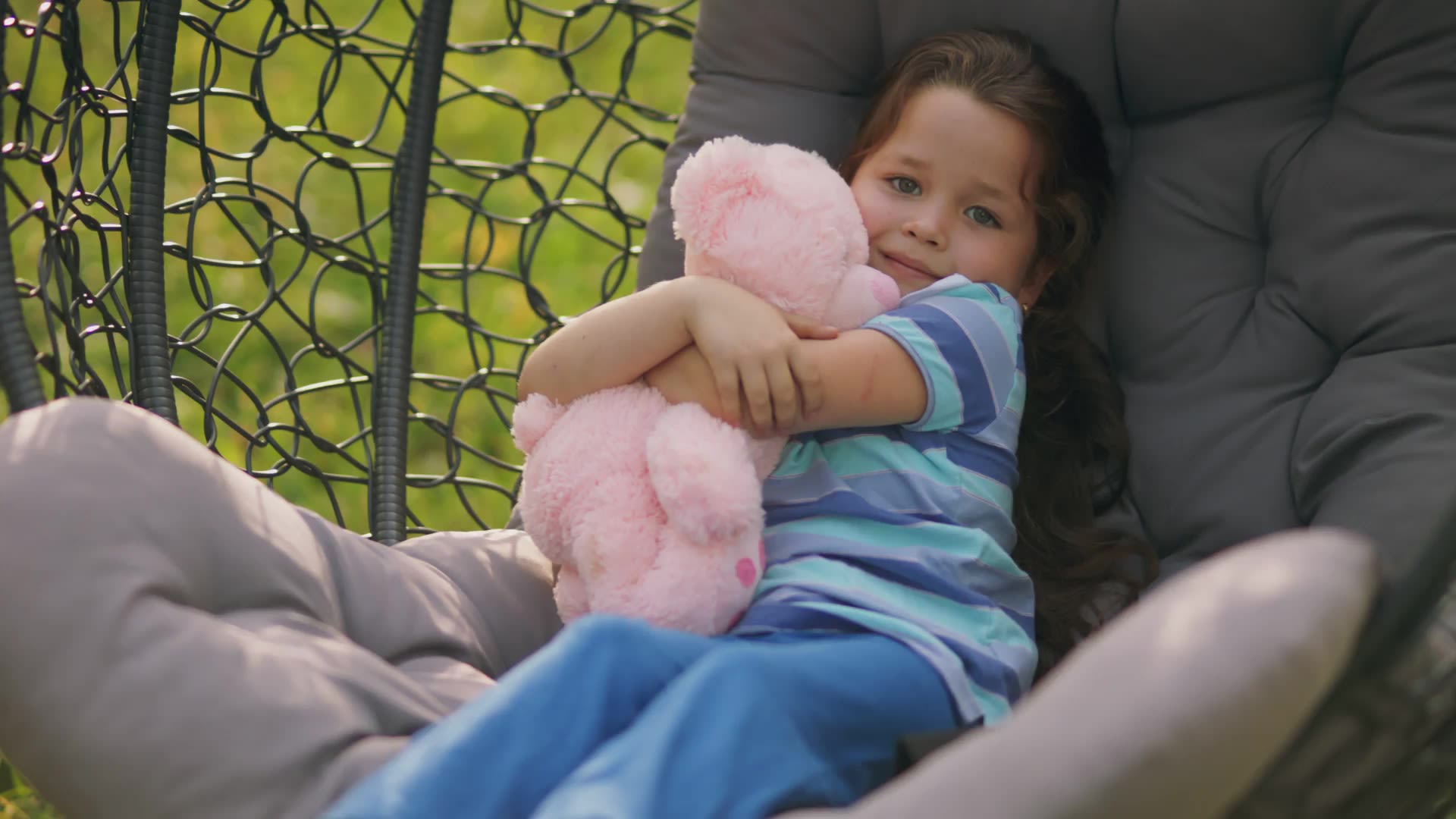
But Michele admits that being on the receiving end of that kind of help, even in the short term, has been hard for her. On the one hand, “It was such a great blessing” to be put up in a hotel and to receive rental assistance soon after the fires. But once she was working again, she turned down additional funds so the money could be distributed to someone else with greater need.
“I’ve never lived through a natural disaster,” she says, noting how draining the sense of displacement is. “It’s difficult because no one’s allowed to heal properly. You’re constantly struggling to know where you’re going to stay.”
She’s now helping to plan a retreat day for parishioners and members of the community in need of “spiritual, mental and physical healing” and seems energized at the prospect, punctuating a recent email with “Aloha” and “God bless you.”
Mental health issues are definitely on the minds of the Catholic Charities Hawaii staff. In the immediate aftermath of the fires, counselors and therapists staffed support stations at the hotels hosting survivors. Hawaii’s geography adds to the challenges of a national shortage of mental health professionals, as clients and practitioners often must travel to another island, by boat or helicopter, for care.
CC Hawaii has set up a telehealth service and is engaging with parishes, hotels and schools, but Shellie describes a general reluctance among people to take part in therapy services. “We’re not getting a whole lot of bites,” she says, “so we’re looking for different ways. Having an informal group format where you’re just being a part of the community and letting people get introduced to the concept of counseling support is helpful.”
Participants at a Catholic Charities senior center have been making crafts, including blankets and stuffed animals for children, that the agency distributes when clients come to get their debit cards. It’s a concrete way for neighbors to help neighbors.
| Recovery, and Better Days Ahead
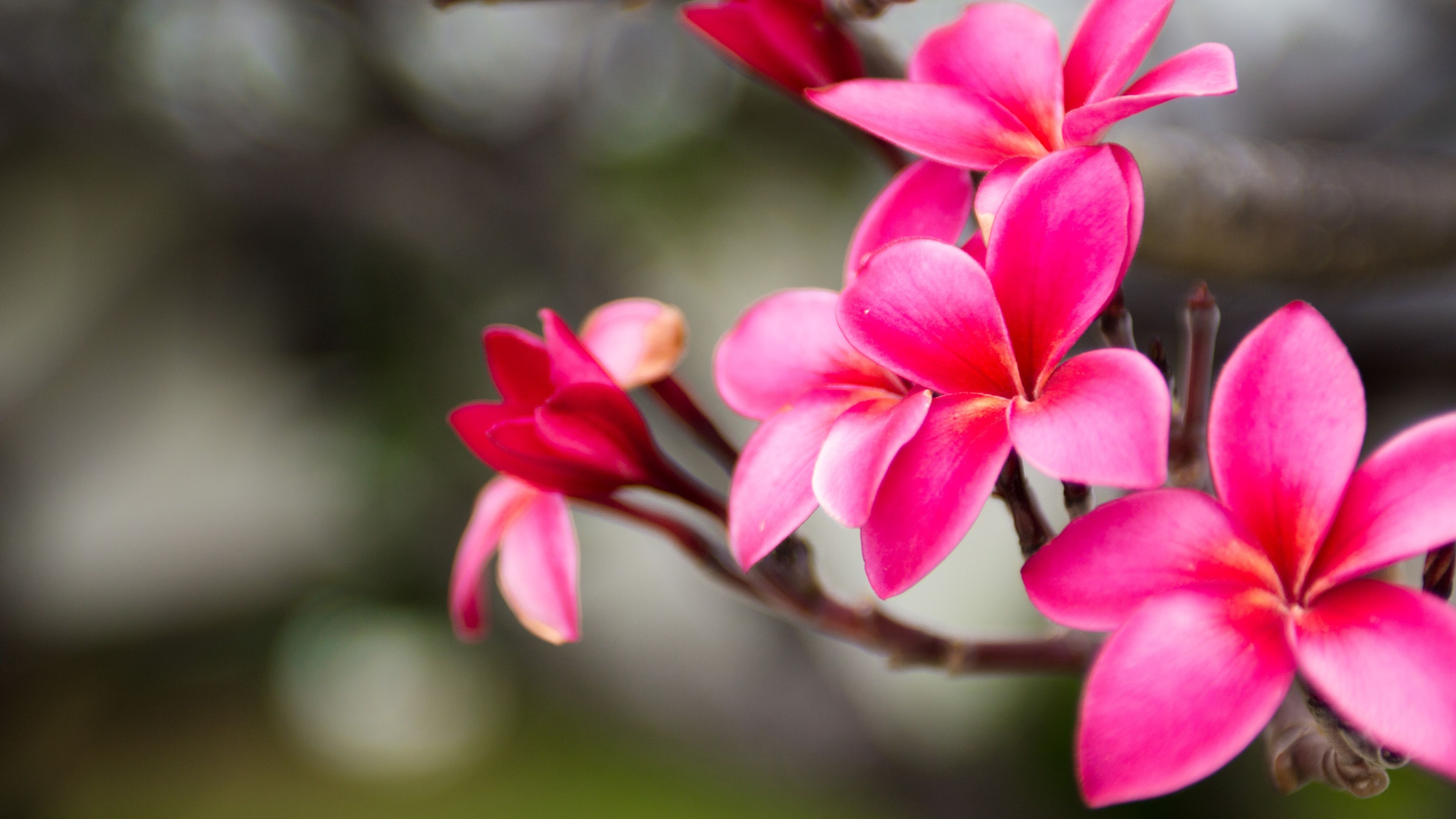
The agency has begun conducting disaster case management, helping survivors put together recovery plans and connecting them to resources. That's been made possible through two grants, one of which is a privately funded state pilot program that began last fall. The other is a FEMA grant that normally would not be available to states until nearly a year after a disaster, but Catholic Charities pursued it within one month of the wildfires. That contract began in February.
As anyone who has experienced a disaster or worked in disaster recovery can tell you, it’s a marathon, not a sprint. Agency staff expect to be working with wildfire clients for years to come.
For the Procells, the couple who drove over the mountain to escape the fires, their recovery has had some high points. After spending a few nights sleeping in their jeep, they settled in at the Hyatt, which is where they connected with Catholic Charities, while picking up solar phone battery chargers.
They moved into a condo in November with assistance from CC Hawaii and immediately decorated it for the holidays, to get a jumpstart on the Christmas spirit. They adopted a puppy — Maverick — for their two youngest kids, to cheer them up. Since he can't make a living as a spearfishing guide while tourism is down, Barrett has gone back to his previous career of real estate, which has been slow. Kat lost all her personal training equipment in the fire and hasn’t been able to restart her business.
“Rebuild is slow but we are alive,” she says, six months out. “We know better days are ahead of us.”
If they needed a concrete sign of that, they got it in early January, when they were allowed back in to inspect what remained of their home. All the metal — pipes, the stove, bicycles — had melted, and everything else had been incinerated. Except for one thing: their family Bible, which was tucked into a metal nightstand.
Barrett Procell visits the site of his burned home and finds everything destroyed, except for one precious item.
Barrett Procell visits the site of his burned home and finds everything destroyed, except for one precious item.
“You might even call it a miracle. Our paper Bible survived, out
of everything that was inside of our home,” says Barrett.
“Everything is nothing but ash, and our Bible survived. Praise God.”
“You might even call it a miracle. Our paper Bible survived, out of everything that was inside of our home, says Barrett.” “Everything is nothing but ash, and our Bible survived. Praise God.”
2050 Ballenger Ave, Suite 400
Alexandria, VA 22314
Tel: 703-549-1390 | catholiccharitiesusa.org
© 2024 Catholic Charities USA. All rights reserved.
Terms of Service | Privacy Policy
CCUSA is a 501(c)(3) non-profit organization.
Federal Tax ID Number 53-0196620

